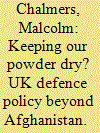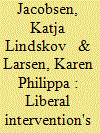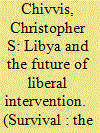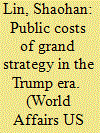| Srl | Item |
| 1 |
ID:
104741


|
|
|
|
|
| Publication |
2011.
|
| Summary/Abstract |
The strain of the past decade's military operations - both in terms of financial overextension and the toll on the armed forces - has called into question the age of liberal intervention begun in Kosovo in the 1990s. As the full impact of the SDSR's costcutting measures are felt in the UK, a mixed approach may be emerging that would balance Alliance commitments, bilateral co-operation and small-scale international missions whilst at the same time managing expectations about the UK's reach and capability.
|
|
|
|
|
|
|
|
|
|
|
|
|
|
|
|
| 2 |
ID:
189099


|
|
|
|
|
| Summary/Abstract |
Liberal intervention actors often understand Russian engagements in Africa through a great power vacuum logic. This logic sees Russian influence as resulting from Russia filling a vacuum where other (notably liberal) interveners downscale. This article unpacks that vacuum logic and explores its consequences and effects. On the one hand, the vacuum logic is central to representations of Russia as an entirely external ‘other’, which contribute to constituting a ‘liberal’ intervention approach and community. On the other hand, exploring Russia's presence in the Central African Republic (CAR) and in Mali challenges this representation, as examples of pragmatic co-existence between Russian and liberal actors become visible. The cases of Mali and CAR also illustrate other challenge, including how the vacuum logic dismisses host state agency and renders longstanding critique of liberal intervention seemingly unnecessary, legitimizing a one-directional critique of Russia's presence in Africa. Failing to appreciate the constitutive and dismissive effects of this great power vacuum logic risks confronting liberal interveners in ways that make them ill-equipped to address critical shortcomings of their own approach. Leaving shortcoming unaddressed may inadvertently provide further grounds for (rather than counter) Russian influence, where Russian actors may take advantage of anti-colonial sentiments and security shortcomings.
|
|
|
|
|
|
|
|
|
|
|
|
|
|
|
|
| 3 |
ID:
116646


|
|
|
|
|
| Publication |
2012.
|
| Summary/Abstract |
The tragic assault on the US consulate in Benghazi on 11 September 2012 raised new doubts about the wisdom of the 2011 intervention in Libya. But while the attack put a question mark over Libya's transition, it did not change the fact that the intervention had toppled Muammar Gadhafi and opened the door to a better future for the country. Without it, hundreds, perhaps thousands, of innocent civilians would have died and the wave of rebellion sweeping across the Middle East and North Africa would likely have been slowed. It was a genuine if moderate success for the North Atlantic Treaty Organisation (NATO), for the United States, and most of all for Libya and the Libyan people. Success, however, was the result of no small amount of good fortune, and it could prove very hard to replicate, so before applying its lessons to other cases (above all Syria), it is critical to assess what was and was not accomplished in Libya, and why.
|
|
|
|
|
|
|
|
|
|
|
|
|
|
|
|
| 4 |
ID:
154416


|
|
|
|
|
| Summary/Abstract |
American grand strategy is at a crossroads. The preferred trajectory of
president-elect Trump, hardball isolationism and nationalism, runs counter to
the American tradition of global leadership and liberal interventionism. Despite
Trump’s preference for a new grand strategy, it is far from preordained that he
will successfully resist Washington’s perennial pull of hegemony once sworn
into office. Therefore, it is imperative to examine the strategic preferences of
the American public, given that it has to bear the costs of this grand strategy.
So what can one expect when the public is disinterested in supporting such an
ambitious grand strategy?
|
|
|
|
|
|
|
|
|
|
|
|
|
|
|
|